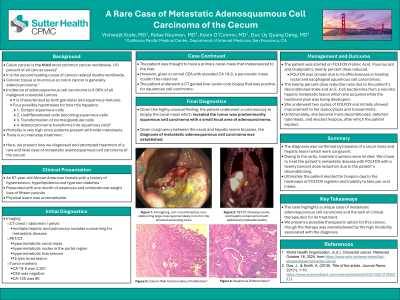Monday Poster Session
Category: Colon
P1979 - A Rare Case of Metastatic Adenosquamous Cell Carcinoma of the Cecum
Monday, October 28, 2024
10:30 AM - 4:00 PM ET
Location: Exhibit Hall E

Has Audio

Vishwajit Kode, MD
California Pacific Medical Center
San Francisco, CA
Presenting Author(s)
Vishwajit Kode, MD, Rafae Nauman, MD, Kevin O'Connor, MD, Duc-uy Quang Dang, MD
California Pacific Medical Center, San Francisco, CA
Introduction: Colon cancer is the third most common cancer worldwide. It is also the second leading cause of cancer mortality worldwide. Given the colon is made of glandular tissue, almost all cases of colon cancer are adenocarcinoma. However, in 0.05 – 0.20 percent of colon cancers, patients can present with adenosquamous cell carcinoma, characterized by both glandular and squamous features. Here, we present how we diagnosed and attempted treatment of a rare and fatal case of metastatic adenosquamous cell carcinoma of the cecum.
Case Description/Methods: A 87-year-old female presented with one month of weakness and 15 pound weight loss. On presentation, she received a CT that showed multiple hepatic and pulmonary nodules concerning for metastatic disease. She underwent a PET/CT that showed a hypermetabolic cecal mass with hypermetabolic nodes in the portal region, hypermetabolic liver lesions and T5 lytic bone lesion. CA 19-9 was 2,261, CEA was negative and CA-125 was 90. Given these findings, the patient was thought to have a primary cecal mass that metastasized to the liver. The patient then had a CT guided liver lesion core biopsy that was positive for squamous cell carcinoma. Given this highly unusual finding, the patient underwent a colonoscopy to biopsy the cecal mass and was found to have squamous cell carcinoma with a small focal area of adenocarcinoma. Given congruency between the cecal and hepatic lesion biopsies, the diagnosis of metastatic adenosquamous cell carcinoma was established. The patient was started on FOLFOX (Folinic Acid, Fluorouracil and Oxaliplatin). The patient underwent two cycles of FOLFOX and initially showed improvement with her leukocytosis and transaminitis. Unfortunately, the patient started to have sinus pauses up to twelve seconds and became more deconditioned, refusing tube feeds. The decision was made to place the patient on hospice, after which the patient expired.
Discussion: Almost all cases of colon cancers are adenocarcinomas with prevalence of adenosquamous cell carcinoma at 0.05 to 0.2 percent, presenting limited treatment options. We chose to treat the patient with FOLFOX given our extensive literature review that showed successful treatment of rectal and esophageal squamous cell carcinomas. This case underscores a unique presentation of metastatic adenosquamous cell carcinoma and the lack of clinical therapeutics for its treatment. Here, we present a possible therapeutic option for a patient and demonstrate the high morbidity associated with the condition.
Disclosures:
Vishwajit Kode, MD, Rafae Nauman, MD, Kevin O'Connor, MD, Duc-uy Quang Dang, MD. P1979 - A Rare Case of Metastatic Adenosquamous Cell Carcinoma of the Cecum, ACG 2024 Annual Scientific Meeting Abstracts. Philadelphia, PA: American College of Gastroenterology.
California Pacific Medical Center, San Francisco, CA
Introduction: Colon cancer is the third most common cancer worldwide. It is also the second leading cause of cancer mortality worldwide. Given the colon is made of glandular tissue, almost all cases of colon cancer are adenocarcinoma. However, in 0.05 – 0.20 percent of colon cancers, patients can present with adenosquamous cell carcinoma, characterized by both glandular and squamous features. Here, we present how we diagnosed and attempted treatment of a rare and fatal case of metastatic adenosquamous cell carcinoma of the cecum.
Case Description/Methods: A 87-year-old female presented with one month of weakness and 15 pound weight loss. On presentation, she received a CT that showed multiple hepatic and pulmonary nodules concerning for metastatic disease. She underwent a PET/CT that showed a hypermetabolic cecal mass with hypermetabolic nodes in the portal region, hypermetabolic liver lesions and T5 lytic bone lesion. CA 19-9 was 2,261, CEA was negative and CA-125 was 90. Given these findings, the patient was thought to have a primary cecal mass that metastasized to the liver. The patient then had a CT guided liver lesion core biopsy that was positive for squamous cell carcinoma. Given this highly unusual finding, the patient underwent a colonoscopy to biopsy the cecal mass and was found to have squamous cell carcinoma with a small focal area of adenocarcinoma. Given congruency between the cecal and hepatic lesion biopsies, the diagnosis of metastatic adenosquamous cell carcinoma was established. The patient was started on FOLFOX (Folinic Acid, Fluorouracil and Oxaliplatin). The patient underwent two cycles of FOLFOX and initially showed improvement with her leukocytosis and transaminitis. Unfortunately, the patient started to have sinus pauses up to twelve seconds and became more deconditioned, refusing tube feeds. The decision was made to place the patient on hospice, after which the patient expired.
Discussion: Almost all cases of colon cancers are adenocarcinomas with prevalence of adenosquamous cell carcinoma at 0.05 to 0.2 percent, presenting limited treatment options. We chose to treat the patient with FOLFOX given our extensive literature review that showed successful treatment of rectal and esophageal squamous cell carcinomas. This case underscores a unique presentation of metastatic adenosquamous cell carcinoma and the lack of clinical therapeutics for its treatment. Here, we present a possible therapeutic option for a patient and demonstrate the high morbidity associated with the condition.
Disclosures:
Vishwajit Kode indicated no relevant financial relationships.
Rafae Nauman indicated no relevant financial relationships.
Kevin O'Connor indicated no relevant financial relationships.
Duc-uy Quang Dang indicated no relevant financial relationships.
Vishwajit Kode, MD, Rafae Nauman, MD, Kevin O'Connor, MD, Duc-uy Quang Dang, MD. P1979 - A Rare Case of Metastatic Adenosquamous Cell Carcinoma of the Cecum, ACG 2024 Annual Scientific Meeting Abstracts. Philadelphia, PA: American College of Gastroenterology.
